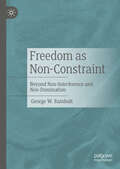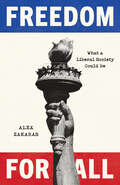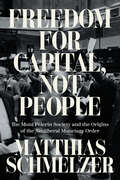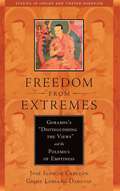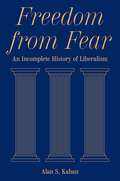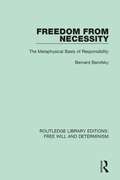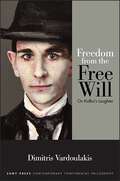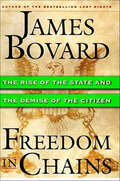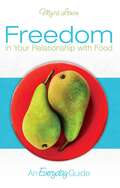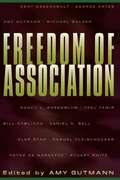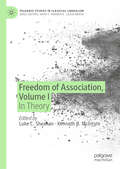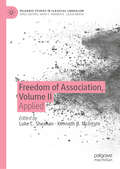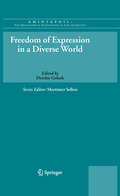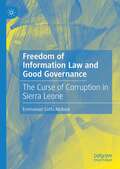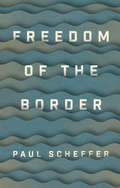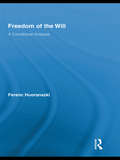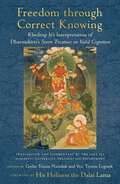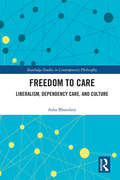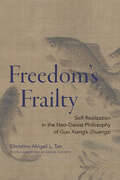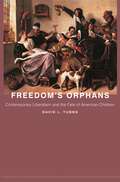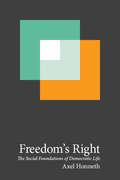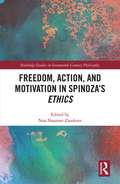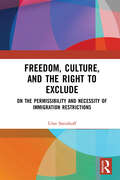- Table View
- List View
Freedom as Non-Constraint: Beyond Non-Interference and Non-Domination
by George W. RainboltWhen is a person free to do something? The focus of much of the recent work on this question has been the debate between those who defend freedom as non-interference (aka liberals) and those who defend freedom as non-domination (aka republicans). This book defends a new answer to this question, freedom as non-constraint. According to freedom as non-constraint, both interference and domination cause unfreedom, both human and natural constraints cause unfreedom, and both controlled and uncontrolled interference cause unfreedom. Compared to liberal and republican theories, freedom as non-constraint provides a better account of systemic and structural threats to freedom, a better picture of how market forces and governments impact freedom, and a better understanding of how the natural world constrains freedom. Freedom as non-constraint also provides a new account of the scalarity of freedom and points to the limits on our ability to measure freedom with precision.
Freedom for All: What a Liberal Society Could Be
by Alex ZakarasA bold vision of liberal society designed to meet the crises of our time Liberalism is on the defensive almost everywhere. In the past decade, right-wing politicians and intellectuals have staged successful assaults on the most important liberal institutions, including democratic constitutions, independent judiciaries, the free media, and the rule of law. Liberalism&’s defenders have struggled to find an adequate response. Many have tried to present liberalism as a humane and reasonable alternative to the chaos and cruelty of the new political right. Political theorist Alex Zakaras argues that this moderate posture is inadequate in our present moment. In the face of rising authoritarianism, rampant inequality, and climate catastrophe, liberals must be willing to demand deep change. Moreover, to compete successfully against charismatic leaders promising dramatic solutions, liberals have to offer a clear and ambitious set of principles and a compelling vision of the future. Zakaras defends a radical version of liberalism, which is designed to attack the massive inequalities in power, wealth, and status that are pulling the United States apart. At its best, liberalism is an emancipatory political project designed to secure freedom for all. Throughout this book, Zakaras explores what it would mean to implement this project in America today, and what it would demand of its citizens.
Freedom for Capital, Not People: The Mont Pèlerin Society and the Origins of the Neoliberal Monetary Order
by Matthias SchmelzerThe definitive history of neoliberal monetary thoughtBased on new archival sources, Freedom for Capital, Not People tells the story of how the Mont Pèlerin Society transformed the world economy. Founded in 1947 by economist Friedrich von Hayek, by the turn of the 1970s the society commanded influence at the highest levels of international monetary policy – with debates sparked by Hayek, Milton Friedman and Ludwig von Mises emigrating from the seminar room to the halls of power. The group&’s collective agenda, the result of years of fierce argument and shrewd political strategising, would dominate the next half century of global capitalism.
Freedom from Extremes
by Jose Ignacio Cabezon Geshe Lobsang DargyayWhat is emptiness? This question at the heart of Buddhist philosophy has preoccupied the greatest minds of India and Tibet for two millennia, producing hundreds of volumes. Distinguishing the Views, by the fifteenth-century Sakya scholar Gorampa Sonam Senge, is one of the most important of those works, esteemed for its conciseness, lucidity, and profundity. Freedom from Extremes presents Gorampa's elegant philosophical case on the matter of emptiness here in a masterful translation by Geshe Lobsang Dargyay. Gorampa's text is polemical, and his targets are two of Tibet's greatest thinkers: Tsongkhapa, founder of the Gelug school, and Dolpopa, a founding figure of the Jonang school. Distinguishing the Views argues that Dolpopa has fallen into an eternalistic extreme, whereas Tsongkhapa has fallen into nihilism, and that only the mainstream Sakya view - what Gorampa calls "freedom from extremes" - represents the true middle way, the correct view of emptiness. Suppressed for years in Tibet, this seminal work today is widely regarded and is studied in some of Tibet's greatest academic institutions. Gorampa's treatise has been translated and annotated here by two leading scholars of Tibetan Buddhist philosophy, and a critical edition of the Tibetan text on facing pages gives students and scholars direct access to Gorampa's own words. Jose Cabezon's extended introduction provides a thorough overview of Tibetan polemical literature and contextualizes the life and work of Gorampa both historically and intellectually. Freedom from Extremes will be indispensable for serious students of Madhyamaka thought.
Freedom from Fear: An Incomplete History of Liberalism
by Alan S. KahanA provocative new history of liberalism that also provides a road map for today’s liberalsFreedom from Fear offers a striking new account of the dominant political and social theory of our time: liberalism. In a pathbreaking reframing of the historical debate, Alan Kahan charts the development of Western liberalism from the late eighteenth century to the present. Examining key liberal thinkers and issues, Kahan shows how liberalism is both a response to fear and a source of hope: the search for a world in which no one need be afraid.Freedom from Fear reveals how liberal arguments typically rely on three pillars: freedom, markets, and morals. But when liberals ignore one or more of these pillars, their arguments generally fail to persuade. Extending from Adam Smith and Montesquieu to today’s battles between liberals and populists, the book examines the twists and turns of the “incomplete” or unfinished liberal tradition while demonstrating its fundamental continuity. It combines fresh accounts of familiar figures such as Tocqueville and Rawls with discussions of less-famous but pivotal thinkers such as A. V. Dicey and Jane Addams, and explores how liberals have dealt with crucial issues, from debates over male and female suffrage to colonialism and liberal anti-Catholicism.By transforming our understanding of the history of liberal thought and practice, Freedom from Fear provides a new picture of the political creed today: the paths liberals need to follow, the questions they need to answer, and the dead ends they must avoid—if they are to win.
Freedom from Necessity: The Metaphysical Basis of Responsibility (Routledge Library Editions: Free Will and Determinism #6)
by Bernard BerofskyThis book, first published in 1987, is about the classic free will problem, construed in terms of the implications of moral responsibility. The principal thesis is that the core issue is metaphysical: can scientific laws postulate objectively necessary connections between an action and its causal antecedents? The author concludes they cannot, and that, therefore, free will and determinism can be reconciled.
Freedom from the Free Will: On Kafka's Laughter (SUNY series in Contemporary Continental Philosophy)
by Dimitris VardoulakisMany of Kafka's narratives place their heroes in situations of confinement. Gregor Samsa is locked in his room in the Metamorphosis, and the land surveyor in The Castle is stuck in the village unable either to leave or to gain access to the castle. Dimitris Vardoulakis argues that Kafka constructs these plots of confinement in order to laugh at his heroes' futile attempts to express their will. In this way, Kafka emerges as a critic of the free will and as a proponent of a different kind of freedom: one focused within the confines of one's experience and mediated by one's circumstances. Vardoulakis contends that his sense of humor is the key to understanding Kafka as a political thinker. Laughter, in this account, is the tool used to deconstruct power. By placing Kafka in dialogue with philosophy and political theory, Vardoulakis shows that Kafka can give us invaluable insights into how to be free—and how to laugh.
Freedom in Chains: The Rise of the State and the Demise of the Citizen
by James BovardGovernments and bureaucracies are bigger and more controlling than ever. A citizen's own ability to control his or her own life has never been less than it has today. How did we get to this point? Jim Bovard, bestselling author of Lost Rights, looks at the development of the State into a behemoth that threatens to destroy the individual at the cost of preserving the idea of "statism"--the belief that government is inherently superior to the citizenry, that progress consists of extending the realm of governmental compulsion, and that vesting more arbitrary power in government officials will eventually make citizens happy. Reading through the history of the state and its war on the citizen, Bovard looks at thinkers as diverse as John Locke, Etienne de la Boetie, James Madison, and Bernard Bosanquet among others. He explores the original version of the idea of the state, the development of the welfare state, the progress of the state's judicial system from the original province of the courts into the lives of men and women and the ultimate fraud that is perpetrated as the state's benevolence. Controversial and essential reading in these times of the Leviathan state, Freedom in Chains is must reading for everyone who took Jim Bovard's Lost Rights to heart as well as anyone trying to understand how far we've come from our eighteenth century roots as a community of impassioned patriots to our sorry positions as wards of the state at the end of the 20th century.
Freedom in Your Relationship with Food: An Everyday Guide (Freedom In Your Relationship With Food Ser.)
by Myra LewinFreedom is Power
by Lawrence HamiltonUsing the history of political thought and real-world political contexts, including South Africa and the recent global financial crisis, this book argues that power is integral to freedom. It demonstrates how freedom depends upon power, and contends that liberty for all citizens is best maintained if conceived as power through political representation. Against those who de-politicise freedom through a romantic conception of 'the people' and faith in supposedly independent judicial and political institutions, Lawrence Hamilton argues that real modern freedom can only be achieved through representative and participative mechanisms that limit domination and empower classes and groups who become disempowered in the conflicts that inevitably pervade politics. This is a sophisticated contribution to contemporary political theory that will be of interest to scholars and students of history, politics, philosophy, economics, sociology, development studies and Southern African studies.
Freedom of Association (The University Center for Human Values Series #49)
by Amy GutmannAmericans are joiners. They are members of churches, fraternal and sororal orders, sports leagues, community centers, parent-teacher associations, professional associations, residential associations, literary societies, national and international charities, and service organizations of seemingly all sorts. Social scientists are engaged in a lively argument about whether decreasing proportions of Americans over the past several decades have been joining secondary associations, but no one disputes that freedom of association remains a fundamental personal and political value in the United States. <P><P>"Nothing," Alexis de Tocqueville argued, "deserves more attention." Yet the value and limits of free association in the United States have not received the attention they deserve. Why is freedom of association valuable for the lives of individuals? What does it contribute to the life of a liberal democracy? This volume explores the individual and civic values of associational freedom in a liberal democracy, as well as the moral and constitutional limits of claims to associational freedom. Beginning with an introductory essay on freedom of association by Amy Gutmann, the first part of this timely volume includes essays on individual rights of association by George Kateb, Michael Walzer, Kent Greenawalt, and Nancy Rosenblum, and the second part includes essays on civic values of association by Will Kymlicka, Yael Tamir, Daniel A. Bell, Sam Fleischacker, Alan Ryan, and Stuart White.
Freedom of Association, Volume I: In Theory (Palgrave Studies in Classical Liberalism)
by Kenneth B. McIntyre Luke C. SheahanThis two-volume set addresses freedom of association, one of the central liberties associated with classical liberalism. The concept of freedom of association has been largely neglected by political and moral philosophers over the past several centuries, despite the fact that the freedom to associate with fellow citizens (and non-citizens) is an implication of almost every version of liberalism capaciously considered. These two volumes take freedom of association seriously both as a theoretical concept and as an integral part of any genuine liberal regime. This first volume considers freedom of association from a theoretical perspective. It considers the freedom of association in conversation with negative liberty, moral pluralism, communitarianism, polycentric democracy, and republicanism.
Freedom of Association, Volume II: Applied (Palgrave Studies in Classical Liberalism)
by Kenneth B. McIntyre Luke C. SheahanThis two-volume set addresses freedom of association, one of the central liberties associated with classical liberalism. The concept of freedom of association has been largely neglected by political and moral philosophers over the past several centuries, despite the fact that the freedom to associate with fellow citizens (and non-citizens) is an implication of almost every version of liberalism capaciously considered. These two volumes take freedom of association seriously both as a theoretical concept and as an integral part of any genuine liberal regime. This second volume considers freedom of association from an applied perspective. It considers the freedom of association in conversation with various theorists (including Hobbes, Locke, Rousseau, and Tocqueville) and in the context of specific case studies.
Freedom of Expression in a Diverse World
by Deirdre GolashThe debate over the foundations and boundaries of freedom of speech, once a matter of balancing the individual rights of unpopular speakers against broader social interests, took on a new shape in the 1980s when feminists began to advocate restrictions on pornography and critical race theorists to advocate restriction of certain kinds of hate speech. These challenges to traditional liberalism brought into sharp focus the issues of why we value free speech and how much weight it should be given against competing values. Difficult as it is to resolve these issues domestically, we now face new challenges arising from the increasingly rapid dissemination of information across international borders in an atmosphere of considerable political tension. The riots in response to the publication of Danish cartoons ridiculing Mohammed and the death threats against Salman Rushdie indicate how dramatically the stakes have been raised. At the same time, there is increased concern over discriminatory treatment of sexual minorities, Muslims, and immigrants. Against this background, the essays in this volume seek to illuminate why we value freedom of speech and expression and how this freedom can be weighed against other values, such as multicultural sensitivity, the rights of racial and sexual minorities, and the prevention of violence, both domestically and internationally.
Freedom of Information Law and Good Governance: The Curse of Corruption in Sierra Leone
by Emmanuel Saffa AbdulaiThis book argues that Sierra Leone’s ten-year civil conflict demonstrates the criticality of freedom of information (FOI) as a facet of good governance where corruption thrives, spanning both public and private sectors, if Sierra Leone’s continued security and stability are to be ensured. It argues that it was the absence of an anti-corruption tool like FOI and its attendants, transparency, and accountability, in governance generally, and in the area of the extractive industry in particular, that lead to other social phenomena which directly sparked the war. It proffers that for the continued consolidation of peace, security, stability and development in Sierra Leone, transparency and accountability must be ensured by protecting and implementing the demand driven anti-graft FOI.Straddling the disciplines of law, political science, public policy, and history, the book’s major premise is that it was the absence of FOI in the area of governance and the extractive industry, which enabled politicians, civil servants and the politically connected to ransom and exploit Sierra Leone’s mineral resources for their own profit with impunity, a state of affairs which led to underdevelopment, state collapse and an embittered civil populace especially the youth. The book postulates that as such any attempt to ensure long-term peace in Sierra Leone, should seek to avoid replicating the conditions that gave rise to that gruesome conflict- elites expropriation of national resources through endemic graft. The book proposes the comprehensive and effective implementation of the Right to Information Act 2013.
Freedom of the Border
by Paul SchefferThere are few issues more contentious today than the nature and purpose of borders. Migration flows and the refugee crisis have propelled the issue of borders into the centre of political debate and revealed our moral unease more clearly than ever. Who are we to deny others access to our territory? Is not freedom of movement a basic human right, one that should be defended above all others? In this book Paul Scheffer takes a different view. Rather than thinking of borders as obstacles to freedom, he argues that borders make freedom possible. Democracy and redistributive justice are only possible with the regulation of access to territories and rights. When liberals ignore an open society’s need for borders, people with authoritarian inclinations will begin to erect them. In the context of Europe, the project of removing internal borders can therefore only be successful if Europe accepts responsibility for its external border. This timely and important book challenges conventional ways of thinking and will be of interest to everyone concerned with the great social and political issues of our time.
Freedom of the Will: A Conditional Analysis (Routledge Studies in Metaphysics)
by Ferenc HuoranszkiFreedom of the Will provides a novel interpretation of G. E. Moore’s famous conditional analysis of free will and discusses several questions about the meaning of free will and its significance for moral responsibility. Although Moore’ theory has a strong initial appeal, most metaphysicians believe that there are conclusive arguments against it. Huoranszki argues that the importance of conditional analysis must be reevaluated in light of some recent developments in the theory of dispositions. The original analysis can be amended so that the revised conditional account is not only a good response to determinist worries about the possibility of free will, but it can also explain the sense in which free will is an important condition of moral responsibility. This study addresses three fundamental issues about free will as a metaphysical condition of responsibility. First, the book explains why agents are responsible for their actions or omissions only if they have the ability to do otherwise and shows that the relevant ability is best captured by the revised conditional analysis. Second, it aims to clarify the relation between agents’ free will and their rational capacities. It argues that free will as a condition of responsibility must be understood in terms of agents’ ability to do otherwise rather than in terms of their capacity to respond to reasons. Finally, the book explains in which sense responsibility requires self-determination and argues that it is compatible with agents’ limited capacity to control their own character, reasons, and motives.
Freedom through Correct Knowing: On Khedrup Jé's Interpretation of Dharmakirti
by Sera Jey English Translation DepartmentDiscover a clear and accessible translation with commentary on key parts of Khedrup Jé&’s Clearing Mental Darkness. Composed at the request of His Holiness the Dalai Lama, this translation with commentary on key parts of Khedrup Jé&’s Clearing Mental Darkness: An Ornament of Dharmakirti&’s &“Seven Treatises on Valid Cognition&” is intended for all levels of understanding. You&’ll learn how a mind realizes its object, which types of consciousness realize their objects, and when a consciousness is considered to be valid in the sense of realizing its object. Having explained valid cognizers, or direct perceivers, which are essential to understanding the four noble truths, Khedrup Jé goes on to brilliantly elucidate this essential teaching of the Buddha and offers a lucid presentation of how to progress on the spiritual paths of liberation and enlightenment, including how to generate yogic perception directly realizing selflessness. With this, one develops an unmistaken realization of the fundamental reality of selflessness of persons and phenomena, which eliminates ignorance, the root cause of all mental afflictions and samsaric suffering.
Freedom to Care: Liberalism, Dependency Care, and Culture (Routledge Studies in Contemporary Philosophy)
by Asha BhandaryThis book presents the first systematic account of dependency care in a liberal theory of justice. Despite the fact that receiving dependency care is necessary for human survival, the practices with which we meet society’s care needs are seldom recognized for their functional role. Instead, norms about gender and race obscure and shape expectations about whose needs for care are legitimate as well as about whose caregiving labor more advantaged members of society will receive. These opaque arrangements must be made visible if we are to remedy skewed intuitions and judgements about care. Freedom to Care develops a modified form of social contract theory with which to evaluate society’s caregiving arrangements. Building on work by feminist liberals and care ethicists, it reframes debates about care to move beyond gender with an inequality-tracking framework that can be employed in any culture. Because care provision has been enmeshed in the subordination of women and people of color, eliminating the invisibility of these forms of labor yields a critical liberal theory of justice with feminist and anti-racist aims.
Freedom's Frailty: Self-Realization in the Neo-Daoist Philosophy of Guo Xiang's Zhuangzi (SUNY series in Chinese Philosophy and Culture)
by Christine Abigail TanThis book starts with the radical premise that the most coherent way to read the Zhuangzi is through Guo Xiang (d. 312 CE), the classic Daoist text's first and most important commentator, and that the best way to read Guo Xiang is politically. Offering an investigation of the notions of causality, self, freedom, and its political implications, the book provides a comprehensive account of freedom that is both ontological and political, using Guo's notion of self-realization (自得 zide). This is a conception of freedom that introduces a "dependence-based autonomy," in which freedom is something we achieve and realize through our connection to others. The notion that a subject is born with freedom—and that one can return to it by isolating oneself from others—would be a strange idea not just to Guo but to most Chinese philosophers. Rather, freedom is complex and frail, and only the kind of freedom that is collectively attained through radical dependence can be worth having. In sum, the book makes a new contribution to Chinese philosophical scholarship as well as philosophical debates on freedom.
Freedom's Orphans: Contemporary Liberalism and the Fate of American Children (New Forum Books #42)
by David L. TubbsHas contemporary liberalism's devotion to individual liberty come at the expense of our society's obligations to children? Divorce is now easy to obtain, and access to everything from violent movies to sexually explicit material is zealously protected as freedom of speech. But what of the effects on the young, with their special needs and vulnerabilities? Freedom's Orphans seeks a way out of this predicament. Poised to ignite fierce debate within and beyond academia, it documents the increasing indifference of liberal theorists and jurists to what were long deemed core elements of children's welfare. Evaluating large changes in liberal political theory and jurisprudence, particularly American liberalism after the Second World War, David Tubbs argues that the expansion of rights for adults has come at a high and generally unnoticed cost. In championing new "lifestyle" freedoms, liberal theorists and jurists have ignored, forgotten, or discounted the competing interests of children. To substantiate his arguments, Tubbs reviews important currents of liberal thought, including the ideas of Isaiah Berlin, Ronald Dworkin, and Susan Moller Okin. He also analyzes three key developments in American civil liberties: the emergence of the "right to privacy" in sexual and reproductive matters; the abandonment of the traditional standard for obscenity prosecutions; and the gradual acceptance of the doctrine of "strict separation" between religion and public life.
Freedom's Right
by Axel HonnethTheories of justice often fixate on purely normative, abstract principles unrelated to real-world applications. The philosopher and theorist Axel Honneth addresses this disconnect, constructing a theory of justice derived from the normative claims of Western liberal-democratic societies and anchored in the law and institutionally established practices that possess moral legitimacy.Termed a "democratic ethical life," Honneth's paradigm draws on the spirit of Hegel's Philosophy of Right and his own theory of recognition, demonstrating how concrete social spheres generate the principles of individual freedom and a standard for what is just. Using social analysis to re-found a more grounded theory of justice, Honneth argues that all crucial actions in Western civilization, whether in personal relationships, market-induced economic activities, or the public forum of politics, share one defining characteristic: they require the realization of a particular aspect of individual freedom. This fundamental truth, Honneth shows, informs the guiding principles of justice, enabling a wide-ranging reconsideration of its theory.
Freedom's Right: The Social Foundations of Democratic Life (New Directions in Critical Theory)
by Axel HonnethTheories of justice often fixate on purely normative, abstract principles unrelated to real-world situations. The philosopher and theorist Axel Honneth addresses this disconnect, and constructs a theory of justice derived from the normative claims of Western liberal-democratic societies and anchored in morally legitimate laws and institutionally established practices. Honneth’s paradigm-which he terms "a democratic ethical life”-draws on the spirit of Hegel’s Philosophy of Right and his own theory of recognition, demonstrating how concrete social spheres generate the principles of individual freedom and a standard for what is just. Using social analysis to re-found a more grounded theory of justice, he argues that all crucial actions in Western civilization, whether in personal relationships, market-induced economic activities, or the public forum of politics, share one defining characteristic: they require the realization of a particular aspect of individual freedom. This fundamental truth informs the guiding principles of justice, grounding and enabling a wide-ranging reconsideration of its nature and application.
Freedom, Action, and Motivation in Spinoza’s "Ethics" (Routledge Studies in Seventeenth-Century Philosophy)
by Noa Naaman-ZaudererThe present volume posits the themes of freedom, action, and motivation as the central principles that drive Spinoza’s Ethics from its first part to its last. It assembles essays by internationally leading scholars who provide different, sometimes opposing interpretations of these fundamental themes as they operate across the five parts of the Ethics and within its manifold domains. The diversity of issues, approaches, and perspectives within this volume, along with the chapters’ common focus, open up new ways of understanding not only some of the key concepts and main objectives in the Ethics but also the threads unifying the entire work. The sequence of essays in the book broadly follows the order of the Ethics, providing up-to-date perspectives of Spinoza’s views on freedom, action, and motivation in their ontological, cognitive, physical, affective, and ethical facets. This enables readers to engage with a variety of new interpretations of these key themes of the Ethics and to reconsider their consequences both for other related issues in the Ethics and for the relevance of the Ethics to contemporary trends in philosophy of action and motivation. The essays will contribute to the growing interest in Spinoza’s Ethics and spark further discussion and debate within and outside the vast body of scholarship on this important work. Freedom, Action, and Motivation in Spinoza’s Ethics will be of interest to scholars and advanced students working on Spinoza and early modern philosophy, as well as on philosophy of action and motivation.
Freedom, Culture, and the Right to Exclude: On the Permissibility and Necessity of Immigration Restrictions
by Uwe SteinhoffThis book argues that citizens have a moral right to decide by which criteria they grant migrants citizenship, as well as to control access to their territory in the first place. In developing and defending this argument, it critically engages numerous objections, thus providing the reader with a thorough overview of the current debate on the ethics of immigration and exclusion. The author’s argument is based on a straightforwardly individualist and liberal starting point. One of the rights granted by liberalism is freedom of association, which also comprises the right not to associate with people with whom one does not want to associate. While this is an individual right, it can be exercised collectively like many other individual rights. Thus, people can decide to collectively organize into an association pursuing certain goals; and subject to certain provisos, this gives rise to legitimate claims to space and territory in which they pursue these goals. The author shows that this right is far-reaching and robust, which entails an equally far-reaching and robust right to exclude. Moreover, he demonstrates that large-scale immigration from illiberal cultures tends to severely compromise the way of life, the values, and the institutions of liberal democracies in ways routinely ignored by apologists for multiculturalism. Freedom, Culture, and the Right to Exclude will be of interest to scholars and advanced students working in applied ethics, political philosophy, political theory, and law.
